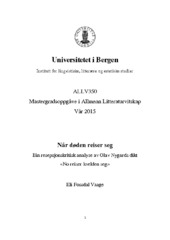Når døden reiser seg. Ein resepsjonskritisk analyse av Olav Nygards dikt "No reiser kvelden seg"
Master thesis

Åpne
Permanent lenke
https://hdl.handle.net/1956/12689Utgivelsesdato
2015-05-15Metadata
Vis full innførselSamlinger
Sammendrag
As the title of this paper suggests, the main focus of this thesis is the theme of death in Olav Nygard's poem “No reiser kvelden seg”. My essential assertion is basically that the poem not only portrays death, it also brings across an image of a more fundamental death than that of the single, human subject. In addition, I find that there is a grander irony conveyed in the poem, the smile in the last stanza can be read as nature's amoral, grim, ironic gesture towards the small and unimportant human subject faced by final expiration. In contradiction to the earlier reception, the theme of death is in my opinion by far the most acute and characteristic feature of the poem. Others have argued that it is a poem in which the erotic, live-giving forces of nature are portrayed – or in fact that the poems harmonic outer form reflects its inner harmonic “message” of cosmic correspondence. My main conclusion is however that, given a close reading of the poem and a sober textual approach, death as the main theme, motif and even force of attraction to the almost invisible lyrical subject is inevitably the result. On a detailed level, words, language, figures and mot ifs all address the problem of death, both in a “small” subjective basis, but also on a larger scale – the last image of the poem can easily be read as an apocalyptic, empty world, symbo lized by the “quiet” beach being washed by heavenly waves.